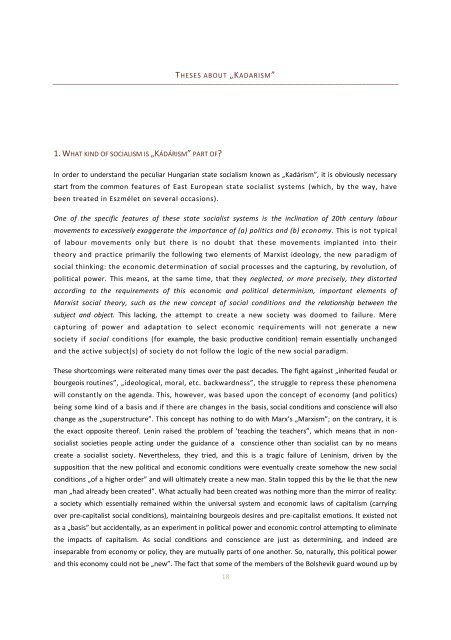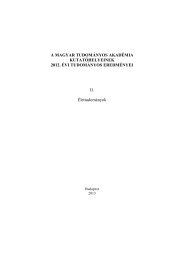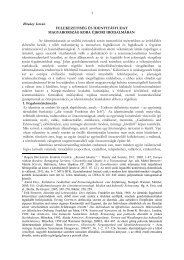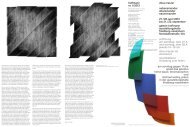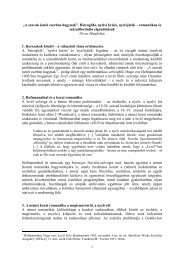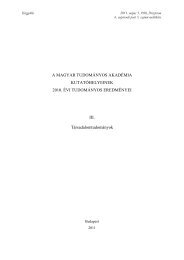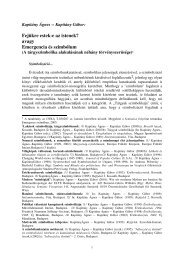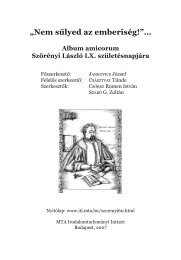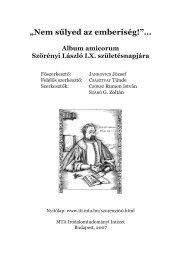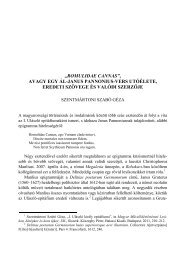symbolic elements of everyday culture - MTA Szociológiai ...
symbolic elements of everyday culture - MTA Szociológiai ...
symbolic elements of everyday culture - MTA Szociológiai ...
Create successful ePaper yourself
Turn your PDF publications into a flip-book with our unique Google optimized e-Paper software.
1. WHAT KIND OF SOCIALISM IS „KÁDÁRISM” PART OF?<br />
THESES ABOUT „KADARISM”<br />
In order to understand the peculiar Hungarian state socialism known as „Kadárism”, it is obviously necessary<br />
start from the common features <strong>of</strong> East European state socialist systems (which, by the way, have<br />
been treated in Eszmélet on several occasions).<br />
One <strong>of</strong> the specific features <strong>of</strong> these state socialist systems is the inclination <strong>of</strong> 20th century labour<br />
movements to excessively exaggerate the importance <strong>of</strong> (a) politics and (b) economy. This is not typical<br />
<strong>of</strong> labour movements only but there is no doubt that these movements implanted into their<br />
theory and practice primarily the following two <strong>elements</strong> <strong>of</strong> Marxist ideology, the new paradigm <strong>of</strong><br />
social thinking: the economic determination <strong>of</strong> social processes and the capturing, by revolution, <strong>of</strong><br />
political power. This means, at the same time, that they neglected, or more precisely, they distorted<br />
according to the requirements <strong>of</strong> this economic and political determinism, important <strong>elements</strong> <strong>of</strong><br />
Marxist social theory, such as the new concept <strong>of</strong> social conditions and the relationship between the<br />
subject and object. This lacking, the attempt to create a new society was doomed to failure. Mere<br />
capturing <strong>of</strong> power and adaptation to select economic requi rements will not generate a new<br />
society if social conditions (for example, the basic productive condition) remain essentially unchanged<br />
and the active subject(s) <strong>of</strong> society do not follow the logic <strong>of</strong> the new social paradigm.<br />
These shortcomings were reiterated many times over the past decades. The fight against „inherited feudal or<br />
bourgeois routines”, „ideological, moral, etc. backwardness”, the struggle to repress these phenomena<br />
will constantly on the agenda. This, however, was based upon the concept <strong>of</strong> economy (and politics)<br />
being some kind <strong>of</strong> a basis and if there are changes in the basis, social conditions and conscience will also<br />
change as the „superstructure”. This concept has nothing to do with Marx’s „Marxism”; on the contrary, it is<br />
the exact opposite there<strong>of</strong>. Lenin raised the problem <strong>of</strong> 'teaching the teachers”, which means that in non-<br />
socialist societies people acting under the guidance <strong>of</strong> a conscience other than socialist can by no means<br />
create a socialist society. Nevertheless, they tried, and this is a tragic failure <strong>of</strong> Leninism, driven by the<br />
supposition that the new political and economic conditions were eventually create somehow the new social<br />
conditions „<strong>of</strong> a higher order” and will ultimately create a new man. Stalin topped this by the lie that the new<br />
man „had already been created”. What actually had been created was nothing more than the mirror <strong>of</strong> reality:<br />
a society which essentially remained within the universal system and economic laws <strong>of</strong> capitalism (carrying<br />
over pre-capitalist social conditions), maintaining bourgeois desires and pre-capitalist emotions. It existed not<br />
as a „basis” but accidentally, as an experiment in political power and economic control attempting to eliminate<br />
the impacts <strong>of</strong> capitalism. As social conditions and conscience are just as determining, and indeed are<br />
inseparable from economy or policy, they are mutually parts <strong>of</strong> one another. So, naturally, this political power<br />
and this economy could not be „new”. The fact that some <strong>of</strong> the members <strong>of</strong> the Bolshevik guard wound up by<br />
18


